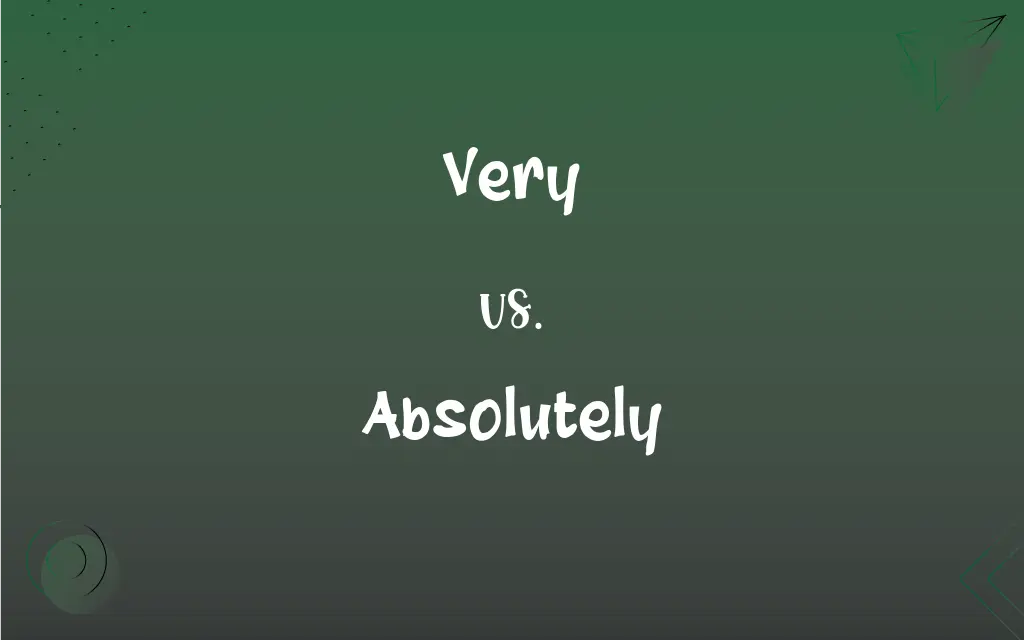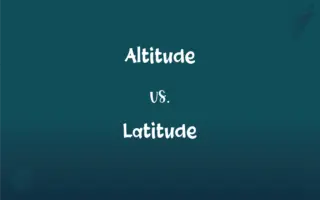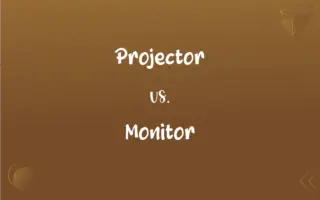Very vs. Absolutely: What's the Difference?
Edited by Aimie Carlson || By Janet White || Updated on September 30, 2023
"Very" intensifies the degree of an adjective/adverb, while "Absolutely" confirms something without doubt or limitation.

Key Differences
"Very" is primarily used as an intensifier to give emphasis to adjectives and adverbs. For example, saying "very tall" means taller than just "tall." "Absolutely," on the other hand, is a word that can indicate complete agreement or certainty about something, as in "I am absolutely sure."
When "very" is used, it signifies a higher degree of something but not necessarily the highest. For example, "very cold" doesn’t mean the coldest possible temperature, just colder than average. "Absolutely," when applied to situations of agreement, leaves no room for doubt or question. If someone is "absolutely certain," there's no ambiguity in their stance.
"Very" can’t stand alone to make a statement, it needs an adjective or adverb to complement it. You wouldn't say "This is very," but you might say "This is very good." In contrast, "absolutely" can serve as a complete response to indicate agreement, as when someone says "Do you agree?" and the reply is simply "Absolutely."
Both "very" and "absolutely" are adverbs, but they have different applications. "Very" modifies the intensity of a word, while "absolutely" can modify verbs to indicate an action done without limitation, such as "She absolutely loves the show."
"Very" suggests a relative increase in the intensity or quality of something. For instance, "very fast" implies faster than usual but not necessarily the fastest. "Absolutely," when indicating extremeness, confirms the utmost degree of something, like "absolutely perfect," meaning without any flaws.
ADVERTISEMENT
Comparison Chart
Primary Use
Intensifier for adjectives/adverbs.
Indicate complete agreement or certainty.
Degree Indication
Suggests a higher degree but not the highest.
Indicates an utmost or extreme degree.
Standalone Usage
Cannot stand alone.
Can stand alone to indicate agreement.
Modifies
Adjectives and adverbs.
Verbs, adjectives, and whole statements.
Implies Limitation
Does not indicate absoluteness.
Indicates something without doubt or limit.
ADVERTISEMENT
Very and Absolutely Definitions
Very
Used for emphasis.
He is very much a beginner.
Absolutely
Without exception; completely.
The answer is absolutely correct.
Very
Precisely; exactly.
That's the very spot we met.
Absolutely
Used to express agreement.
Are you coming? Absolutely!
Very
Truly; absolutely.
That's the very best cake I've had.
Absolutely
With unlimited power or authority.
The king ruled absolutely.
Very
Nearly; almost.
It was very nearly a disaster.
Absolutely
Definitely; certainly.
I am absolutely sure about my decision.
Very
In a high degree; extremely
Very happy.
Very much admired.
Absolutely
Without qualification or restriction; completely
The substance was absolutely pure.
Very
Truly; absolutely
The very best advice.
Attended the very same schools.
Absolutely
Used as an intensive
I absolutely love that restaurant. That's absolutely ridiculous.
Very
Very Used in titles
The Very Reverend Jane Smith.
Absolutely
As you say. Used to indicate agreement.
Very
Complete; absolute
At the very end of his career.
Absolutely
In a manner that does not take an object.
Very
Being the same; identical
That is the very question she asked yesterday.
Absolutely
In an absolute relationship.
Very
Being particularly suitable or appropriate
The very item needed to increase sales.
Absolutely
In an absolute or unconditional manner; utterly, positively, wholly.
Very
Used to emphasize the importance of what is specified
The very mountains shook.
Absolutely
Independently; viewed without relation to other things or factors.
Very
Being nothing more than what is specified; mere
The very act of riding in the car made him dizzy.
Absolutely
(grammar) In a manner that does not take an object.
Very
(Archaic) Genuine; true
"Like very sanctity, she did approach" (Shakespeare).
Absolutely
Yes; certainly; expression indicating strong agreement.
Very
(literary) True, real, actual.
The fierce hatred of a very woman.
The very blood and bone of our grammar.
He tried his very best.
We're approaching the very end of the trip.
Absolutely
In an absolute, independent, or unconditional manner; wholly; positively.
Very
The same; identical.
He proposed marriage in the same restaurant, at the very table where they first met.
That's the very tool that I need.
Absolutely
Completely and without qualification; used informally as intensifiers;
An absolutely magnificent painting
A perfectly idiotic idea
You're perfectly right
Utterly miserable
You can be dead sure of my innocence
Was dead tired
Dead right
Very
With limiting effect: mere.
Absolutely
Totally and definitely; without question;
We are absolutely opposed to the idea
He forced himself to lie absolutely still
Iron is absolutely necessary
Very
To a great extent or degree.
That dress is very you.
Not very many (of them) had been damaged.
She's very like her mother.
‘Is she busy?’ ― ‘Not very.’
Absolutely
In an absolute manner; unrestrictedly.
She trusts him absolutely.
Very
Conforming to fact, reality or rule; true.
Very
(with superlatives) Used to firmly establish that nothing else surpasses in some respect.
He was the very best runner there.
Very
True; real; actual; veritable.
Whether thou be my very son Esau or not.
He that covereth a transgression seeketh love; but he that repeateth a matter separateth very friends.
The very essence of truth is plainness and brightness.
I looked on the consideration of public service or public ornament to be real and very justice.
Very
In a high degree; to no small extent; exceedingly; excessively; extremely; as, a very great mountain; a very bright sun; a very cold day; the river flows very rapidly; he was very much hurt.
Very
Precisely as stated;
The very center of town
Very
Being the exact same one; not any other:;
This is the identical room we stayed in before
The themes of his stories are one and the same
Saw the selfsame quotation in two newspapers
On this very spot
The very thing he said yesterday
The very man I want to see
Very
Used to give emphasis to the relevance of the thing modified;
His very name struck terror
Caught in the very act
Very
Used to give emphasis;
The very essence of artistic expression is invention
The very back of the room
Very
Used as intensifiers; `real' is sometimes used informally for `really'; `rattling' is informal;
She was very gifted
He played very well
A really enjoyable evening
I'm real sorry about it
A rattling good yarn
Very
Precisely so;
On the very next page
He expected the very opposite
Very
To a high degree or extent.
She was very pleased with the gift.
FAQs
Can "absolutely" modify a verb?
Yes, like "She absolutely refuses to go."
Does "very" always mean the highest degree of something?
No, "very" indicates a higher degree but not necessarily the highest.
Is "absolutely" always used to show agreement?
No, it can also indicate complete certainty or extremeness.
Is "very" an adverb?
Yes, "very" is primarily used as an adverb to modify adjectives and adverbs.
Can "absolutely" stand alone as a reply?
Yes, "absolutely" can stand alone to indicate agreement.
Can "very" be used alone?
No, "very" needs to modify an adjective or adverb, like "very cold."
What part of speech is "absolutely"?
"Absolutely" is primarily an adverb.
Can "absolutely" be synonymous with "completely"?
Yes, in some contexts like "absolutely certain" or "completely certain."
Can "very" intensify nouns?
No, "very" primarily intensifies adjectives and adverbs.
How does "absolutely perfect" differ from "very perfect"?
"Absolutely perfect" implies without flaws, while "very perfect" is grammatically redundant and less commonly used.
Can "very" be used with gradable adjectives?
Yes, like "very tall" or "very short."
Is "absolutely" stronger than "very"?
In many contexts, "absolutely" indicates a stronger or more definite stance than "very."
Can both words be used in positive and negative contexts?
Yes, e.g., "very unhappy" or "absolutely wrong."
Does "very" have origins in Old English?
Yes, "very" comes from the Old French word "verai," derived from the Latin "verus" meaning "true."
Is "very" a formal word?
"Very" is neutral and can be used in both formal and informal contexts.
About Author
Written by
Janet WhiteJanet White has been an esteemed writer and blogger for Difference Wiki. Holding a Master's degree in Science and Medical Journalism from the prestigious Boston University, she has consistently demonstrated her expertise and passion for her field. When she's not immersed in her work, Janet relishes her time exercising, delving into a good book, and cherishing moments with friends and family.
Edited by
Aimie CarlsonAimie Carlson, holding a master's degree in English literature, is a fervent English language enthusiast. She lends her writing talents to Difference Wiki, a prominent website that specializes in comparisons, offering readers insightful analyses that both captivate and inform.































































